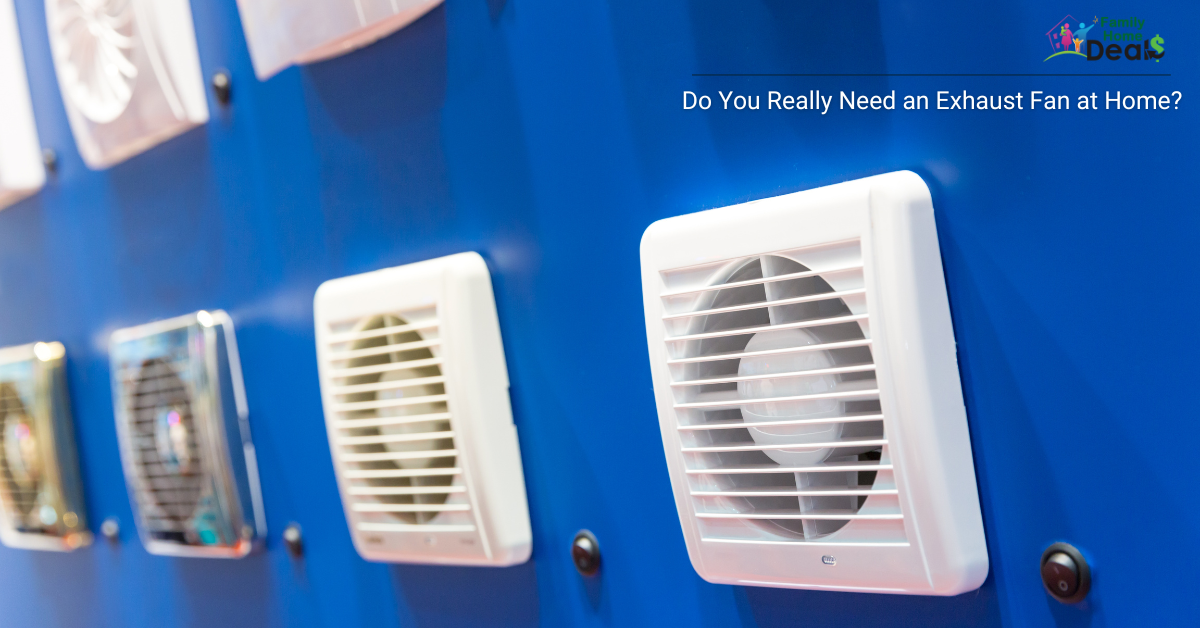
Have you ever wondered whether having an exhaust fan at home is truly necessary? You might think that an open window does the job just fine, but the reality is that exhaust fans can make a significant difference in maintaining a fresh and healthy environment in your living spaces. Whether you’re dealing with steamy bathrooms, smoky kitchens, or stuffy rooms, these fans are designed to pull out unwanted air and bring in the fresh. But how effective are they really, and are there any downsides you should be aware of? Also, is it okay to leave an exhaust fan running all the time, or could that lead to more problems than it solves?
In this article, we’ll dive deep into the importance of having an exhaust fan at home, explore how effective they are, weigh the pros and cons, and finally, discuss whether or not it’s safe to keep them running around the clock. By the end, you’ll have a clear understanding of whether you should invest in these handy appliances and how to use them most effectively in your home.
Why You Might Need an Exhaust Fan at Home
Improves Air Quality
One of the primary reasons for having an exhaust fan at home is to improve indoor air quality. When cooking, showering, or even just breathing, we release moisture, smoke, odors, and sometimes harmful pollutants into the air. Without proper ventilation, these can build up, leading to stuffy air that feels uncomfortable and can even be harmful over time.
Exhaust fans work by pulling these particles and moisture out of your home, replacing them with fresh air. In the kitchen, they help remove smoke, grease, and cooking smells, while in the bathroom, they pull out steam and odors, preventing the growth of mold and mildew. This makes them essential for keeping your home not only comfortable but also healthier to live in.
Prevents Moisture-Related Problems
Excess moisture is the enemy of any home. It can lead to a host of problems, including mold growth, warped wood, peeling paint, and even structural damage. Bathrooms are particularly vulnerable to moisture buildup, especially after hot showers. Without an exhaust fan, that moisture has nowhere to go, creating the perfect environment for mold and mildew to thrive.
In kitchens, steam from cooking can also lead to moisture problems, especially if your cooking area doesn’t have a window or if you often cook with oil. By removing this excess moisture, exhaust fans help protect your home from these common, yet serious, issues.
Controls Odors and Smoke
Cooking can leave lingering odors that may not be pleasant, especially when you’re frying foods or cooking something with a strong smell like fish. While lighting a scented candle or spraying air freshener can help mask these smells, they don’t remove them. An exhaust fan, on the other hand, actively pulls the odors out of your home, ensuring they don’t stick around long after you’ve finished your meal.
Moreover, in case of smoke from cooking or even from an unexpected small fire, an exhaust fan can quickly clear the air, preventing it from spreading to other parts of your home. This is especially important in open-plan living spaces where kitchen odors can easily waft into your living room or bedrooms.
Keeps Your Home Cool
During the summer months, an exhaust fan can help keep your home cool by venting out hot air. While it’s not a substitute for an air conditioner, it can make a noticeable difference in reducing the overall temperature, especially in areas like the kitchen, where heat tends to build up quickly.
Reduces Humidity Levels
High humidity levels in your home can lead to discomfort, as well as potential damage to walls, ceilings, and furniture. Excess humidity is also an ideal breeding ground for dust mites and mold. By reducing humidity, exhaust fans help maintain a comfortable environment and protect your belongings from moisture damage.
Is an Exhaust Fan Effective?
Designed for Targeted Ventilation
Exhaust fans are specifically designed for targeted ventilation, meaning they’re incredibly effective at removing air from specific areas of your home. When placed in the right spots, like above your stove or in your bathroom, they can efficiently remove smoke, moisture, and odors, replacing them with cleaner air.
Quick Air Circulation
One of the key benefits of exhaust fans is their ability to quickly circulate air. They can exchange stale indoor air with fresh outdoor air within minutes, depending on the size and power of the fan. This rapid air movement is particularly useful when you need to clear the air quickly, such as after burning something on the stove or taking a steamy shower.
Energy Efficiency
Compared to other ventilation methods, exhaust fans are relatively energy-efficient. They don’t require a lot of power to operate, and modern exhaust fans often come with energy-saving features like timers and motion sensors. This means you can improve air quality and comfort in your home without significantly increasing your energy bills.
Effectiveness Depends on Proper Installation
While exhaust fans are effective, their efficiency depends largely on proper installation. If not correctly installed, they may not remove air as effectively, and in some cases, they could even push air into unwanted areas, like your attic. It’s important to ensure that exhaust fans are vented outside rather than into another part of your home to avoid issues with moisture and air quality.
The Disadvantages of Exhaust Fans
Noise Levels
One of the most common complaints about exhaust fans is the noise. While newer models are designed to be quieter, some can still be quite loud, especially if they’re powerful. This noise can be distracting, particularly in smaller homes or apartments where sound carries easily. If noise is a concern, it’s worth investing in a quieter model, though these can be more expensive.
Can Cause Energy Loss
Exhaust fans work by pulling air out of your home, and in doing so, they can also pull out conditioned air, leading to energy loss. During the winter, for example, they may remove warm air that you’ve paid to heat, forcing your heating system to work harder. Similarly, in the summer, they could remove cool air, leading to higher air conditioning costs. To minimize this, it’s best to use exhaust fans only when necessary and to choose energy-efficient models.
Potential for Drafts
Since exhaust fans remove air from your home, they can create drafts, especially if your home isn’t well-sealed. This can lead to cold spots in the winter or unwanted hot air entering your home in the summer. While this isn’t a huge issue for most people, it’s something to consider if you live in an area with extreme temperatures.
Maintenance and Cleaning
Exhaust fans require regular maintenance to remain effective. Dust, grease, and moisture can build up on the fan blades and in the ducts, reducing their efficiency and potentially leading to malfunctions. Regular cleaning is necessary to keep them running smoothly, which can be a hassle, especially for fans that are hard to reach.
Possible Air Contamination
If exhaust fans are not properly vented to the outside, they can lead to indoor air contamination. For example, in kitchens, if the exhaust fan vents into the attic instead of outside, it can push grease and moisture into your attic, creating the perfect environment for mold and pests. This is why professional installation is so important to ensure the fan works as intended.
Is It Okay to Leave an Exhaust Fan On All the Time?
The Case for Limited Use
While exhaust fans are effective, leaving them on all the time is generally not recommended. Running an exhaust fan continuously can lead to energy waste, higher utility bills, and unnecessary wear and tear on the fan itself. Most exhaust fans are designed for intermittent use, such as during and after cooking or showering, rather than continuous operation.
Risk of Overuse
Overusing an exhaust fan can also create negative pressure in your home. When too much air is removed, it can cause a vacuum effect, pulling in air from outside through any cracks or gaps. This can bring in outdoor pollutants, allergens, and humidity, negating the benefits of the fan. Additionally, continuous use can dry out the air inside your home, leading to discomfort, especially in winter when indoor air is already dry.
Ideal Usage Times
The best time to use an exhaust fan is during activities that generate moisture, odors, or smoke. In the bathroom, turn on the fan before you start a shower and leave it running for about 15 to 20 minutes after you’re done to remove all the moisture. In the kitchen, use the fan while cooking, especially when frying or boiling, and leave it on for a short time afterward to clear any remaining smells or smoke.
Energy-Efficient Alternatives
If you’re concerned about air quality and feel the need to keep air circulating in your home, consider using energy-efficient alternatives like a whole-house ventilation system or an air purifier. These systems are designed to run continuously without the drawbacks of an exhaust fan, providing a healthier and more energy-efficient solution.
5 Best exhaust fans if you plan to have one at home
Choosing the right exhaust fan for your home depends on various factors, such as the room size, the level of moisture or odors, and your budget. To help you make an informed decision, here are five of the best exhaust fans available, each excelling in different aspects like efficiency, quiet operation, and design.
1. Broan-NuTone AE110L Exhaust Fan
Best for: Quiet Operation
- Features: This model is renowned for its quiet performance, operating at just 1.0 sones. It’s also designed to provide efficient ventilation with a 110 CFM airflow capacity.
- Pros: Very quiet, effective for small to medium-sized rooms, easy to install.
- Cons: Higher price point compared to basic models.
- Why It’s Great: Ideal for bathrooms where noise can be a concern. The Broan-NuTone AE110L ensures you get effective ventilation without disrupting your peace.
2. Panasonic FV-0511VQ1 WhisperCeiling Exhaust Fan
Best for: Energy Efficiency
- Features: Known for its energy efficiency and ultra-quiet operation, this fan operates at 0.3 sones and has a 50 CFM airflow capacity. It’s also Energy Star rated.
- Pros: Extremely quiet, energy-efficient, long-lasting, and comes with a built-in damper to prevent backdrafts.
- Cons: Installation might be complex for DIYers.
- Why It’s Great: Perfect for those looking to minimize energy costs while still enjoying a quiet environment. Its durability also makes it a long-term investment.
3. Air King BFQ 140 High Performance Bath Fan
Best for: High Performance
- Features: This fan offers high performance with a 140 CFM airflow capacity and operates at 4.0 sones. It’s designed for effective ventilation in larger bathrooms.
- Pros: Powerful airflow, good for larger rooms, built-in backdraft damper.
- Cons: Louder compared to quieter models, larger footprint.
- Why It’s Great: If you have a larger bathroom or need higher airflow, the Air King BFQ 140 is a robust option that ensures effective air removal.
4. Delta Breez SLM70 Slim Bathroom Exhaust Fan
Best for: Compact Spaces
- Features: This slim, low-profile fan operates at 0.3 sones and has a 70 CFM airflow capacity. It’s designed to fit in smaller spaces where traditional fans might be too bulky.
- Pros: Compact design, very quiet, energy-efficient.
- Cons: Lower CFM might not be sufficient for larger bathrooms.
- Why It’s Great: Its slim profile makes it ideal for tight spaces, and it offers efficient ventilation without taking up much room.
5. Holmes HAPF624-U Tower Fan
Best for: Multi-Function Use
- Features: Although not a traditional exhaust fan, this tower fan features a ventilation mode that can help with air circulation. It includes a HEPA filter for additional air quality improvement.
- Pros: Multi-function (can be used as a fan and air purifier), good for larger rooms, modern design.
- Cons: Not a direct replacement for an exhaust fan, less effective for direct ventilation needs.
- Why It’s Great: A versatile option if you want a fan that offers both air circulation and purification, ideal for those who need more than just exhaust.
To Fan or Not to Fan?
So, do you really need an exhaust fan at home? The answer depends on your specific needs and the layout of your home. If you often find yourself dealing with moisture, odors, or smoke, an exhaust fan can be an incredibly effective tool for maintaining air quality and preventing damage to your home. They’re especially useful in bathrooms and kitchens, where moisture and smells are most common.
However, it’s important to use exhaust fans wisely. Overuse can lead to energy waste, drafts, and other issues. To get the most out of your exhaust fan, use it strategically during times when you need it most, and make sure it’s properly installed and maintained. With the right approach, an exhaust fan can be a valuable addition to your home, providing both comfort and protection.



